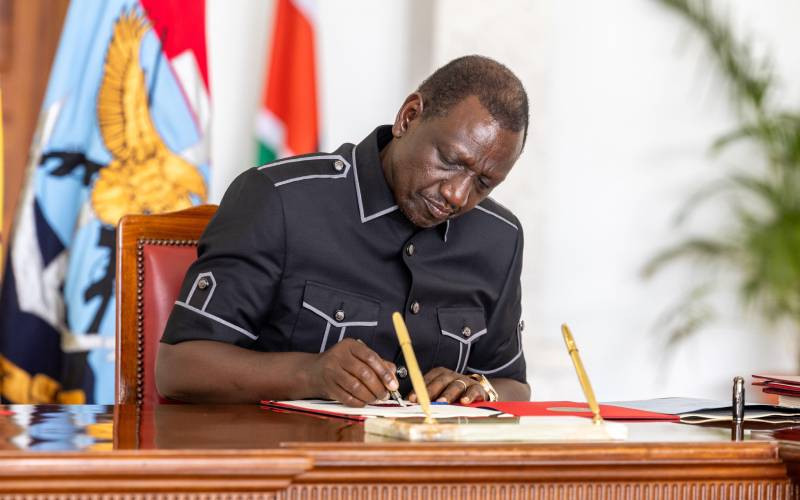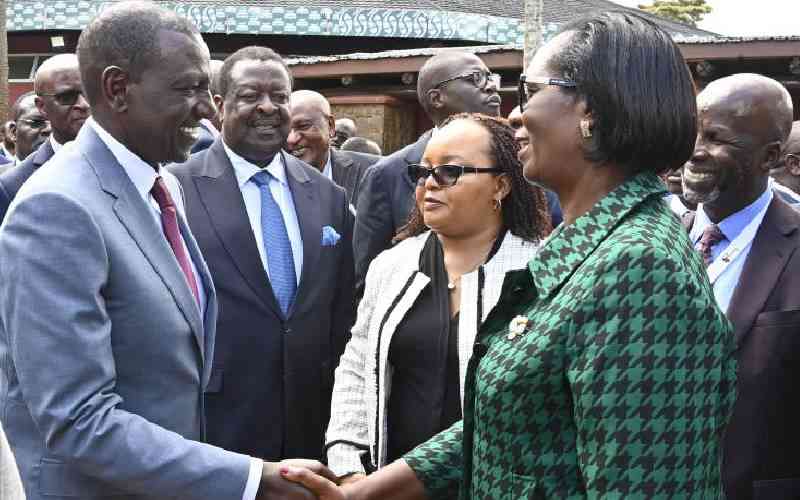By ALEX NDEGWA
Back from strike over fear his or her job would be scrapped, your chief would soon have a new role sanctioned by Cabinet and subject to parliamentary approval.
Chiefs would be empowered to register and give the force of law to the so-called come-we-stay marriages that have lasted beyond six months in their jurisdictions.
What this means are the traditional marriagesfor which other than oral acceptance in a cultural settings and probably exchange of dowry, there is nothing binding or holding it together and so may be broken at will, exposing the woman to neglect.
But in case you miss the point, it is not about child brides or other forms of forced marriages, or even under-age liaisons. No, the couple must be a union of adults and freely living together.
The Marriage Bill has been pending for nearly five years because of controversial provisions, which promise the institution of marriage will undergo radical changes.
The proposed law seeks to apply common standards for assessing gender justice in the family in the context of international law and the Constitution, which is seen to upset traditions.
Contentious provisions in the draft law included recognition of polygamous marriages and the outlawing mandatory payment of dowry.
Access growth
Another provided for either spouse to maintain the other in case of separation. The Bill cleared by the Commission for the Implementation of the Constitution provided that court may order a person to pay maintenance to his or her spouse or former spouse.
The court intervention is in case a person has refused or neglected to provide for the spouse as required by the Act or if the person has deserted his or her spouse.
Cabinet approved the draft law, which if passed by Parliament, would make the chief’s signature probably the most sought for by women in marriages whose future look bleak in the face of rogue and wayward husbands. Or even those who fear they might be disinherited if their spouses die. The Marriage Bill provides for the legalising of ‘come-we-stay’ marriages – a reference to an arrangement whereby a man and woman live together as husband and wife although there is no legal recognition.
Under the law, it is proposed that chiefs be empowered to consider ‘come-we-stay’ affairs that last more than six months as a marriage, and to register them as such.
This apparently is intervention for women in marginalised regions who ordinarily would not have the means to have their marriages legally recognised due to cultural prejudices.
The Bill also targets the so-called ‘serial polygamists’ who marry and chase away vulnerable women at will.
Stay informed. Subscribe to our newsletter
A statutory marriage refers to a wedding performed in church, at the DC’s office, or at the Registrar of Marriages in the Attorney General’s Chambers. A certificate of marriage is issued upon the conclusion of such a ceremony.
If Parliament passes the proposed law, chiefs would issue marriage certificates, a move that assures them their jobs are safe, as the country moves to devolved governments, after March 4 elections.
The Marriage Bill also makes it possible for customary and ‘come-we-stay’ marriages to have marriage certificates.
“This law now provides legal protection to all marriages and will facilitate the protection of the rights of children and spouses in all marriages,” a Cabinet brief released by Presidential Press Service stated.
The Marriage Bill consolidates in one law Christian, Islamic, Hindu marriages, and others consummated under Civil and African Customary law. It also provides for maintenance of spouses and children in a situation where a marriage has broken down or divorce has occurred.
Marriages recognised under the Kenyan Law include Statutory, customary, Islamic, and Hindu.
The law allows for marriages under the various customs, but when a couple gets married under the Islamic or Hindu laws, such a union is known as Islamic or Hindu Marriage.
Cabinet also passed the Matrimonial Property Bill, which provides for the rights and responsibilities of spouses in relation to matrimonial property.
It provides for equal legal status of men and women in marriage and recognises the capacity of either spouse to acquire separate property during marriage.
Further, it makes provisions for how persons professing the Islamic faith should be governed by Islamic Law in all matters relating to matrimonial property.
In addition, the Bill provides for how matrimonial property shall be dealt with in cases of polygamous and customary marriages.
The Bill also allows for spouses to enter agreements as to how they would own property, either separately or jointly.
“It also provides for division of matrimonial property between spouses in the context of Customary Law, particularly in polygamous unions,” the statement added.
To curb domestic violence, the Cabinet also passed the law on protection against domestic violence. It seeks to deal with the protection and relief for victims of domestic violence.
The draft law empowers courts to make orders to protect victims to avoid cases of intimidation. It is borne out of the realisation that silence by victims has fueled domestic violence. It also seeks to ensure speedy, inexpensive, and simplified procedures for justice to victims.
The Bill also requires perpetrators of domestic violence to undergo counselling to deter violent tendencies.
It also makes provision for counselling programmes for victims of domestic violence. The law will also provide a robust legal framework for protection of children in cases of domestic violence.
 The Standard Group Plc is a
multi-media organization with investments in media platforms spanning newspaper
print operations, television, radio broadcasting, digital and online services. The
Standard Group is recognized as a leading multi-media house in Kenya with a key
influence in matters of national and international interest.
The Standard Group Plc is a
multi-media organization with investments in media platforms spanning newspaper
print operations, television, radio broadcasting, digital and online services. The
Standard Group is recognized as a leading multi-media house in Kenya with a key
influence in matters of national and international interest.
 The Standard Group Plc is a
multi-media organization with investments in media platforms spanning newspaper
print operations, television, radio broadcasting, digital and online services. The
Standard Group is recognized as a leading multi-media house in Kenya with a key
influence in matters of national and international interest.
The Standard Group Plc is a
multi-media organization with investments in media platforms spanning newspaper
print operations, television, radio broadcasting, digital and online services. The
Standard Group is recognized as a leading multi-media house in Kenya with a key
influence in matters of national and international interest.








